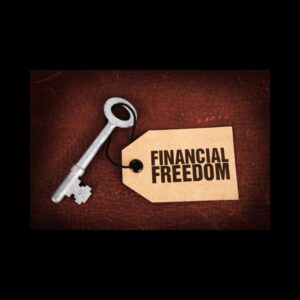What is the importance of financial freedom? The majority of the post will be spent on this very question. There are probably dozens, if not hundreds, of reasons financial freedom is important, but we will break down the top 10 reasons.
What is Financial Freedom?
Before we get more into the importance of financial freedom, it would be fitting to provide a clear definition of what it is. I’ve heard varying definitions, but I’ll give you mine. It’s when you no longer need to actively work to support your lifestyle. When assets cover living costs, big or small.
For some people, living costs might entail a studio apartment with minimal travel and entertainment costs. For others, living costs might encompass maintaining a large house, lots of travel, frequent dinners at expensive restaurants, and high entertainment costs. Whatever the lifestyle, financial freedom is the ability to pay for that lifestyle without having to actively work.
Related: Financial Freedom for Sale
The Financially Free Person Can Still Work
The financially free person can still work. In fact, many still do because they love what they do, want to contribute by working, feel valued at work, or myriad other reasons. It’s just that the financially free person doesn’t have to work to support their lifestyle.
Financial Freedom vs Debt Free
Financial freedom is not the same as debt free. A financially free person can still have debt, and a debt free person is not necessarily financially free. It’s possible to be both financially free and debt free, but being debt free isn’t a prerequisite to financial freedom.
Financial freedom has already been defined in the last section, so let’s define debt free. Debt free is simply that there is no debt. No consumer debt, no student loans, no mortgage–no debt whatsoever. While being debt free is nice, it doesn’t automatically equate to financial freedom.
A 25-year old recent college graduate who has paid off his student loans and credit card, and has no other debt is technically debt free. Definitely a good position to be in, but far, far away from financial freedom. He still has monthly rent, bills to pay, and normal living costs that need to be supported by work.
Compare and contrast that to a 32 -year old who has been working and investing for the past decade. She has accumulated enough assets to pay for her living costs and no longer needs to work to support her lifestyle. She also has real estate debt in her rental properties, but her properties cash flow enough where the debts are paid every month with several hundred dollars left over.
The 25-year old is debt free but the 32-year old with debt on her rental properties is in a far superior position. One is financially free while the other is debt free. Both really good positions, but one is clearly superior.
Related: Financially Free vs Debt Free
Why Financial Freedom?
On to the big question of the post: What is the importance of financial freedom? Or in other words, why financial freedom?
There are many topics related to personal finance. Debt paydown, becoming debt free, spending habits, financial behavior, investing, and so much more. While all are very important, I place an even higher importance on financial freedom.
The financial free person who remains financially free has done something right. They may not have done everything right, and still probably continue to make the occasional mistake, but they’re doing a lot right. It’s not easy to become financially free or stay that way.
Number 1: Increased Choices
Financial freedom, plain and simple, gives us more choices. More choices of where to shop for groceries, what kind of work to do, where to live, where to send our children to school, and much more. The financially free person may not take advantage of all those choices, but the options are there.
For example, a financially free person may choose to work in a career that offers more satisfaction than someone who is living paycheck to paycheck. They get to pick their hours, many of the tasks they want to perform, and what part of the country to work in.
Number 2: Ability to Play the Long Game
Number two on the importance of financial freedom is the ability to play the long game. The financially free person is in a position to make decisions based on long-term outlooks. Not just the short-term goal of day to day survival and taking care of basic needs.
Case in point is someone who takes on employment at a small company or starts their own business. They may not make as much in the beginning as if they were working with a large company, but there might be a much higher upside. There’s the possibility of less hours worked in the future, more money to be made, control over systems put in place, etc.
Related:
- Crushing Your Long-Term Financial Goals
- It’s OK to Change Your Personal Finance Goals
- Short-Term Financial Goals: Plus 29 Ideas to Start
Number 3: Values Aligned with Spending
Unless they inherited a large sum of money or got lucky, the financially free individual probably has made intelligent decisions in the past. More than likely their values are also aligned with their spending. This is a point not to be understated.
When our values are aligned with our spending, we get increased clarity. We use our money only for necessities and things we value, and nothing else. Nothing is wasted, but there is also no deprivation, or a feeling of missing out. That means there is financial harmony, an important concept I write about in detail in my book Cash Uncomplicated.
Related: How Value-Based Spending Can Change Your Life
Number 4: Fresh Outlook
With financial freedom comes a fresh outlook. Decisions are made on values, lifestyle, and life goals rather than money. The money part is still important to the financially free person, but it’s not the driving factor. Because money is already taken care of, it doesn’t have to be the deciding factor in anything.
That doesn’t mean the financially free person can go crazy and start buying everything in sight. That’s an easy way to move from financially free to not financially free. It just means that things other than money will weigh heavier in the decision making process. It’s why a person in this situation can move from a high stress career that pays sell to a lower stress career that doesn’t pay as well.
Number 5: Less Stress
Money is a very powerful word. For those in a challenging financial situation, the word alone can invoke stress, fear, and trepidation. That’s where the importance of financial freedom comes into play. The financially free person might have many other things to stress about, but money isn’t one of them.
Sure, we’re all going to worry when our kids are out late with friends or if a loved one gets sick. And many things we stress about are out of our control. But money is something that can get reigned in. This happens gradually over time but it’s a very powerful concept that is more than about money.
Number 6: Feeling of Accomplishment
Often overlooked is the feeling of accomplishment. This isn’t something that shows up on the balance sheet, but it is nonetheless significant. Life isn’t all about money or meeting financial metrics.
A big part about life is putting your mind to something, setting a goal, taking actions to complete the goal–and finally reaching the goal. There’s a feeling of satisfaction and accomplishment that comes with it. Think about a sports team that wins the championship in a professional sport.
There are bonuses and other financial incentives that come with the championship, but the main reason for putting the hours in the weight room, practice field, and film room is for the victory and championship itself. That sense of accomplishment. Same goes for achieving a goal–whether it be financial, athletic, career, family, etc.
Number 7: What You Become in the Process
The importance of financial freedom isn’t just financial. In addition to the sense of accomplishment written about in the last section, achieving financial freedom is just as much about what you become in the process.
In order to achieve financial freedom, you must become better in the process. Jim Rohn said “Set goals not for the outcome itself, but for who you get to become in the process.” Unless you inherited a bunch of money or won the lottery, there is no getting around this.
You have to get better or the financial reward of financial independence will not come to fruition. That means acquiring new skills, getting outside your comfort zone, trying new things, and taking calculated risks. Meeting and overcoming challenges helps you grow as a person, and it’s natural that your bank account will grow parallel to that.
Number 8: Increased Confidence
As you accomplish your goals, it’s natural for confidence to increase. When you set a goal like achieving financial freedom, and accomplish it–confidence skyrockets. You’ve set your mind on a long-term goal and reached it. That’s a big deal, and a big win.
The importance of achieving a goal like financial freedom also gives you the confidence to set other big goals. You’ve already accomplished a very large financial goal, so why not go for bigger things? It doesn’t even have to be in the personal finance space. It can be a health, family, travel, or any other type of goal.
It really doesn’t matter what the new goal is because you have the confidence you can reach it. Many people spend a lifetime trying to reach financial freedom and don’t reach it. You’ve already reached it and can now set your sights on other milestones.
Number 9: Improved Relationships
Money arguments are often cited as one of the top causes of divorce in the United States. Gaining financial freedom isn’t a guarantee to resolve all money conflicts but it sure helps. And not just because financial freedom has been reached.
It’s also what has happened in the past to get to financial freedom. If a couple has reached financial freedom, something right has happened along the way. There likely have been ebbs and flows and challenges, and maybe even a few money disagreements–but a lot has gone right to reach financial freedom.
A couple who has reached financial freedom together has been through the fire and come out on top. They not only get the benefits of financial freedom, but also the benefit of overcoming the struggles and adversity it took to get there. When it happens organically, the victory is all the sweeter.
Number 10: Financial Harmony
Last but not least in the importance of financial freedom is achieving financial harmony. Financial harmony isn’t necessarily about being “rich” or “wealthy.” It’s about a feeling that you have enough and are safe and secure in your personal finances.
Financial harmony is a feeling of having enough for basic needs, wants, travel plans, family commitments, and much more. It’s almost impossible to put an exact number on financial harmony. Some get it when they reach six figures, others probably don’t get it until they are in the millions, or tens of millions. Identify what your number is and work toward it.
Conclusion
The importance of financial freedom goes well beyond the dollar amount or balance sheet. More choices, improved relationships, a fresh outlook, less stress, increased confidence–these are all benefits that go beyond the dollar amount.
Gaining control of personal finances and eventually achieving financial freedom is a reflection of our values, the way we live, the choices we make, and our ability to follow through on plans. So it’s not just about money–it’s about all of these things–ultimately culminating in financial freedom.
What is the importance of financial freedom for you?











